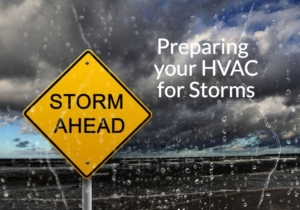Can Severe Winds Mean Trouble for your Home?
Your HVAC system isn’t just another piece of equipment, it’s an investment for protecting your family. Which is why it’s a smart idea to ensure your investment is protected. Whether you currently have a heating and cooling system, or if you’re considering installing one, consider these great tips to help protect your family from potential issues that may arise due to a storm. It’s important to understand what to do before a potential storm hits, and what to do afterwards to ensure your HVAC is running at peak efficiency inside your home.
Preparing Your HVAC – Before the Storm
First, if you have an older HVAC system, you might want to think about replacing it. If it’s struggling to keep the house warm or cool, this could cost you more to run and repair over time. A new system will save you money on energy bills, and keep your family comfortable.
Before any major storms are on the horizon, preparation is your best tool against any potential damage to your heating and cooling equipment. Preventative maintenance is probably the most important aspect of preparation for a storm. Replacing dirty air filters, as well as clearing air vents and ducts will ensure proper airflow within your home.
Another thing to keep in mind is making sure your thermostats are in working order because if it isn’t accurate, your home will feel uncomfortable. Programmable thermostats can help cut costs by automatically adjusting to your home’s needs. If you think the power may go out, pre-cool or pre-heat your home to a higher temperature. Close the curtains and blinds and keep the windows and doors shut to keep the temperature moderate.
If you’re expecting heavy storms, you may need to bolt your equipment directly to concrete or tie them down with special straps. If the weather is particularly severe in your area, you may want to do both. If you have an air conditioning unit placed in your window, you may want to cover it both inside and out or remove it for the duration of the storm.
Another important aspect to consider is that lightning storms and power surges can be devastating for your HVAC unit (or any other electronics or appliances for that matter). Installing a surge protector will take the majority of the damage, but it isn’t 100%. Be sure to switch off your HVAC equipment, appliances and electronics before the storm becomes too heavy. Finally, when you do switch off your HVAC, cover it with a tarp or invest in a weather shield cover to avoid any falling debris potentially damaging your equipment.
Preparing Your HVAC – During the Storm
It’s important to note that you can’t use your HVAC while it’s covered during a storm. Double-check your surge protectors and turn everything off via the circuit breaker. If you have any outdoor lawn furniture, umbrellas, potted plants, bikes, etc, make sure they’re secured inside the garage or shed. If you are sheltering during a heavy storm, move the family to a small, windowless room or hallway on the lowest floor. In the event of major flooding, ascend to your home’s highest floor, but avoid the closed attic as you may get trapped. If you’re told to evacuate, evacuate immediately. Don’t drive around barricades, and avoid fast-moving water. If your area is prone to flooding, consult a professional about elevating your HVAC equipment for improved protection.
In the event of a snowstorm, you should check to see if any ice or snow has collected on top of your heat pump. Although heat pumps are designed to be able to handle a modest amount of snow, it’s still a good idea to double-check during snowstorms. Ice and snow will block airflow and cause potential issues for your home.
Preparing Your HVAC – After the Storm
Now that the storm has passed, it’s time to safely assess your home and take necessary steps to ensure everything – including your HVAC – is in proper, working order. Be sure to remove the covering as soon as it’s safe outside, as you don’t want moisture getting trapped inside your HVAC, potentially causing mold, mildew or rust. Always check your unit for damage before turning it back on, as it could have been damaged from flooding or flying debris. If the unit did get damaged, the problem could be made worse by turning it back on, so when you do, make sure to listen for any unusual noises as that may be an indicator of possible internal damage. Always contact a professional HVAC company for a proper inspection, because they will be able to confirm everything is functioning properly and safely.
Should You Purchase a Generator?
Investing in a backup generator could be beneficial in case of emergency. If you do end up losing power, keeping a generator in place to keep your important appliances running can be a lifesaver. Consider how much power your home requires to function properly, and use an online electrical calculator to determine the right size generator for your home. If in doubt, consult a professional. Much like an HVAC, they can be installed with housing units and enclosures to protect them.
As far as options go, there are basically two options. If you’re looking for something small that will sufficiently power your most important appliances, purchase a portable generator. If you’re looking to power your entire home while the power is out, a permanent generator would be the better option. Much like an HVAC, always be sure to keep both options away from confined spaces.
How Else Can You Prepare Your HVAC for the Storm?
Performing regular maintenance can greatly help out towards ensuing storms. Any existing problems within your HVAC can compound even further during a severe weather storm. If your airflow is already blocked due to dirt and debris, any additional debris will restrict airflow further and cause more internal damage to your equipment.
When preparing for a storm, be sure to stock clean drinking water, non-perishable food, medical kits, any important prescriptions or medications, wipes, flashlights and batteries in case of emergency.
At Lockhart Industries, we’ve been proudly serving Duncan, Victoria and southern Vancouver Island since 1981. Whether you’re looking to invest in a new HVAC system or inquiring about regular maintenance, our professionals are here to help with any and all of your heating and cooling needs.
Call (250) 748-1731 or request an estimate and get started today.
Easy Financing with…
Start Saving Money NOW! There’s no need to putting off a more Energy Efficient, Cost Effective home comfort system. We make it simple!
With Financeit you can:
- Make additional payments any time without penalty.
- Get a lower payment by choosing an amortization period of up to 180 months. 7.99% to 11.99% interest rate.*
- We add a small fee to the loan amount. There are no hidden or additional charges
- Bank-level encryption (AES-256 bit SSL) to protect your personal information.




